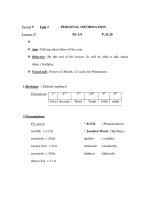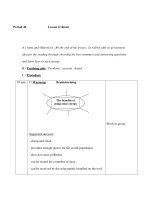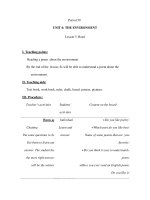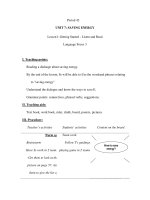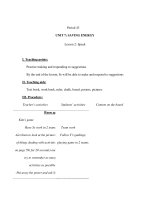Period 45 - UNIT 7: SAVING ENERGY - Lesson 3: Read pps
Bạn đang xem bản rút gọn của tài liệu. Xem và tải ngay bản đầy đủ của tài liệu tại đây (4.98 MB, 6 trang )
Period 45
UNIT 7: SAVING ENERGY
Lesson 3: Read
A / Aims and Objectives :
By the end of the lesson , Ss will be able to get general idea for the reading
through choosing the best summary and answering questions and know
how to save energy .
B / Teaching aids :
Textbook , cassette , board
C / Procedure :
Teacher’s activities Students’
activities
Content on the board
Warm up :
Brainstorming
Suggested answers :
- cheap and clean
- provides enough power
for the world population
Work in group
Cheap and clean
The benefits of
using solar energy
- does not cause pollution
- can be stored for a
number of days .
- can be received by the
solar panels installed on
the roof of a house .
- can be used on cloudy
days .
- help save money as well
as natural resources
=> lead in the new lesson
Pre- reading :
Introduce the topic of the
reading passage and some
new words to Students
Checking vocabulary
What and where
Repeat chorally ,
individually and
guess its meaning
, then copy down
.
1-vocabulary :
- Luxury >< Necessity (n)
Sự xa xỉ >< sự cần thiết
- Consumer (n) : người tiêu dùng
- Household (n) : hộ gia đình .
- Account for (v) : thay mặt cho
- Labeling scheme (n) :kế hoạch
dán nhãn
- Tumble dryer (n) : máy sấy
- Innovation (n) : sáng kiến
Play games .
- to conserve -> conservation (n)
–bảo tồn
- category (n) loại
While - reading :
1. Scanning and
skimming
- Ask Ss to read the
passage very quickly and
answer the following
questions :
1. What continents are
mentioned in the text ?
2. Are electricity, gas and
water luxuries or
necessities?
- Call on some Ss to
answer the questions .
- Give feedback:
read the passage
quickly and
answer the
questions
Answers
1. America and Europe
2. They are necessities
2. Choosing the best
2.Reading
summary :
+ Which of the following
is the best summary of the
passage ?
- Have Ss read the
passage more carefully
and choose the best
summary for it among
four following options
( In the text book )
- Ask them to work in
groups to find out the best
answer
- Call on some Ss to give
explanation for their
choice
3. Answering
questions :
- Have Ss read the
passage again and answer
the questions .
Work in groups
- Demonstrate in
front o class .
Work in group
Present their ideas
in front of class .
a- Choosing the best summary :
=> North American and
European countries are interested
in saving money and natural
resources. (It is the best answer
because three others are too
specific. They only cover part of
the passage )
b- Comprehension questions
Answer keys
1. They are interested in products
that will not only work
effectively but also save money .
2. To spend less on lighting we
replace an ordinary 100 watt light
bulbs by using saving bulbs .
3. She will pay US $ 2
- Ask them to compare
with a friend .
- call on some Ss to read
their answers aloud in
front of class .
- Give feedback :
4. The purpose of the labeling
scheme is to tell the consumer
how energy efficient each model
is, compared with other
appliances in the same category .
Post - reading :
Discussion
- Have Ss work in group
of 4 Ss to find out the
answers .
1. What should we save
energy ?
2. What should we do to
save money and natural
resources ?
- Call on the
representative from each
group to present in front
Work in group of
4 Ss to find out
the answers.
Possible answers
1 . Because we want to save
money and natural resources.
2. - Use solar energy instead of
coal , gas and oil .
- Use energy – saving house
hold appliances like bulbs ,
refrigerators , stoves , cookers .
- Reduce the amount of water
and electricity we use .
- Turn off the faucets , the TV
or radio when we do
not use them .
of class .
- Give feedback :
Set homework
1. Summarize main points
.
2. Let Ss do the exercises
( 5 ,6 ) in the workbook
3. Preare he next lesson
3- Homework :
Do the exercises ( 5 ,6 ) in the
workbook
Preare the next lesson
